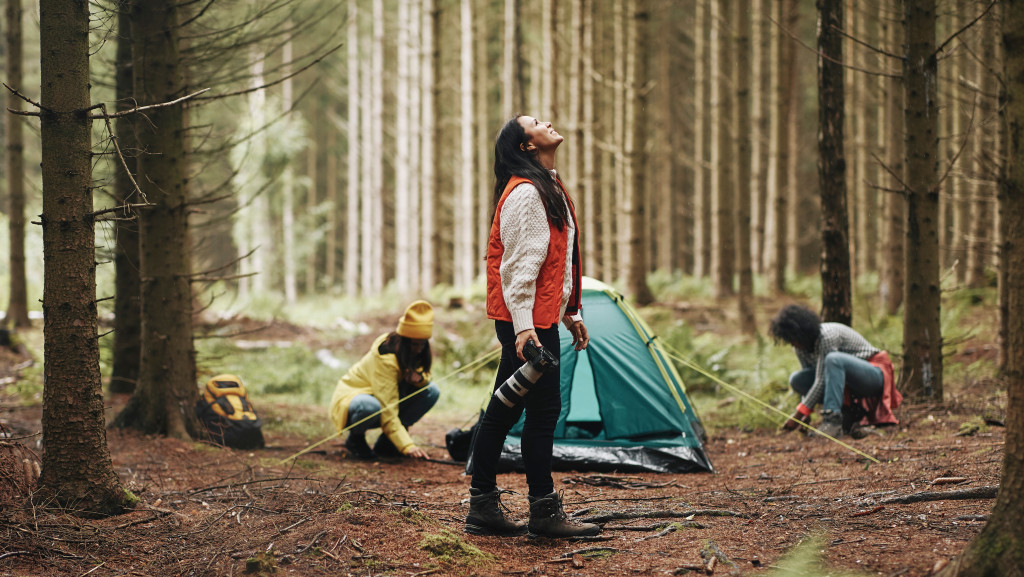- Camping offers unique experiences, positively impacting mental and physical health and providing opportunities for connection with nature.
- Seek beginner-friendly camping spots, use online resources, join outdoor groups, or ask local supply stores.
- Secure essential gear, including a reliable shelter, cooking equipment, safety and survival essentials, and comfort items for a better experience.
- Improve camping skills like setting up tents, starting fires, navigation, recognizing harmful plants, and handling wildlife encounters.
Camping offers a unique, fulfilling experience that allows you to connect with nature on a deeper level. It is not just about pitching tents and lighting campfires; it’s about creating a retreat away from bustling city life, where you can rejuvenate and reconnect with your inner self and the natural world.
Studies have shown that camping has an array of positive impacts on well-being. For instance, a study from the University of Michigan revealed that being in nature for just 20 minutes can significantly reduce stress hormone levels. Additionally, a study by the University of Exeter found that people living in areas with more green spaces have lower cortisol levels, the body’s primary stress hormone, suggesting less stress overall.
Regarding physical health, camping, and associated outdoor activities like hiking or canoeing can significantly contribute to your fitness levels. According to the Harvard Medical School, a 185-pound person can burn around 266 calories after 30 minutes of general camping chores.
However, you might be a first-time camper facing certain apprehensions about the trip. Here is a helpful guide to make sure you’re well-prepared for your camping retreat:
Find the Beginner-Friendly Camping Spots

Identifying beginner-friendly camping sites is crucial for first-time campers. These campgrounds often have clean toilets, potable water, and designated fire pits, which can help ease the transition from city living to outdoor survival. It’s also less likely that such spots are located in isolated locations, providing a sense of security for those unused to sleeping in the wilderness.
To find these camping spots, you can utilize online resources such as ReserveAmerica, which allows you to search campgrounds by amenities, location, and more. Outdoor organizations or camping clubs can also be a wealth of information. Joining these groups can provide opportunities to learn from experienced campers, gain advice, or even find a camping buddy. Local outdoor supply stores are another excellent resource as the staff usually know nearby camping locations. Remember, a pleasant first camping experience can be a firm foundation for future outdoor adventures.
If you have a group of friends with experience in camping, you can also explore more remote or secluded sites that may not be featured on popular camping sites. However, it is essential to be extra careful when setting up camp in the wilderness; always follow Leave No Trace guidelines and leave the place as you found it.
Secure the Essential Gear

Equipping yourself with essential camping gear is integral to a successful camping trip. The right gear enhances the camping experience and ensures safety and preparedness for unpredictable outdoor scenarios. It is particularly crucial for first-time campers to have quality equipment, as that can significantly ease the transition from the familiar comforts of home to the unpredictable outdoors.
Shelter
Camping shelters are the most fundamental piece of any camping gear. Tents, campervans, hammocks, or bivy sacks are some options, depending on your camping style and the environment. For first-time campers, a sturdy camping shelter is generally the best bet. It provides a secure, private space and offers protection from weather elements. When choosing a tent, consider its size, weight (for hiking campers), and how easy it is to set up.
Cooking Equipment
Cooking is an integral part of the camping experience. Gathering around a campfire or a camping stove for a shared meal is often a trip highlight. Essential cooking equipment includes a portable stove, fuel, a lighter or matches, and durable cookware. Don’t forget utensils and biodegradable soap for cleaning up!
Safety and Survival Gear
In the wilderness, safety should always be paramount. Every camper should have a well-stocked first aid kit, including bandages, antiseptics, pain relievers, and personalized medication. Other safety essentials include a multi-tool, a compass or a GPS, a headlamp or flashlight with extra batteries, and a whistle for emergencies.
Comfort Items
While these are not essential for survival, comfort items can significantly enhance your camping experience, especially for first-timers. Consider packing chairs, an inflatable pillow, a sleeping mat or air mattress, and a book or games for when you want to unwind in your camp. Remember, the goal of camping is also to relax and enjoy the great outdoors!
Learn Camping Skills
Practicing camping skills before your trip is crucial for ensuring a smooth and enjoyable experience. Mastering basic skills like pitching a tent, starting a campfire safely, and navigating with a compass or a map can significantly increase your confidence and preparedness for the unpredictable aspects of outdoor living.
Moreover, recognizing potentially harmful plants or responding to wildlife encounters can be vital for your safety. Simple skills, such as learning to tie different knots, can also prove surprisingly handy in various situations.
Remember, the more proficient you are at these skills, the more time you can spend enjoying the serenity and beauty of nature rather than grappling with the challenges it might pose. Practice these skills in a safe and controlled environment before venturing on your camping trip for the best experience.
Final Thoughts
Whether experienced outdoorsmen or first-time campers, spending time in nature can be a profoundly rewarding experience. This guide ensures you are well-prepared for an enjoyable and safe camping retreat. And if you’re looking for more tips and tricks to make the most of your trip, there is plenty of information online from fellow outdoor enthusiasts.




